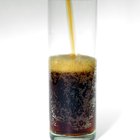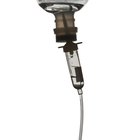
Drinking alcohol is a fairly normal behavior among adults, with over half of Americans claiming to be regular drinkers, according to the 2011 National Health Interview Survey -- a questionnaire carried out by the Centers for Disease Control and Prevention. It is important to get the facts on normal and abnormal alcohol consumption before you decide whether your boyfriend might have a problem, and what to do about it if he does.
Understanding Moderate Drinking
One drink is the equivalent of 12 fluid ounces of beer, 5 fluid ounces of wine or 1.5 fluid ounces of liquor. If your boyfriend is consuming fewer than two drinks per day, then he is drinking moderately, according to the chapter "Foods and Food Components to Reduce" in the 2010 Dietary Guidelines for Americans, published by the USDA Center for Nutrition Policy and Promotion. These guidelines state that moderate alcohol consumption is associated with a lower risk of cardiovascular disease and lower blood pressure, and that it may help to protect cognitive functioning as the individual grows older.
Types of Problematic Drinking
Binge drinking is classed by the National Institute on Alcohol Abuse and Alcoholism as any consumption that brings the blood alcohol concentration (BAC) level to 0.08 percent or more, which, in males, corresponds to five or more drinks on a single occasion consumed within a two- to three-hour period. Heavy drinking is classified, for men, as consuming an average of more than two drinks per day, or more than 14 drinks per week. Your boyfriend's engaging in either type of drinking could signal a problematic pattern.
Decide Your Own Limits
While excessive alcohol intake has its hazards, even moderate drinking has been linked with an increased likelihood of violence and accidents. Only you can decide whether you are willing to deal with the potential risks associated with your boyfriend's alcohol use. However, relationship breakdown is less common in partners who consume roughly the same amount of alcohol, according to a study of marriage survival rates among 19,977 couples, carried out by researchers from the Norwegian Institute of Public Health and published under the title "Discordant and Concordant Alcohol Use in Spouses as Predictors of Marital Dissolution in the General Population: Results from the Hunt Study" in the journal "Alcoholism: Clinical and Experimental Research."
Helping Him Choose Sobriety
If you do decide to stay with your boyfriend, even though he drinks, there may be ways in which you can encourage him to reduce his alcohol consumption. Rewarding your boyfriend when he chooses not to drink is an effective way of reinforcing that behavior, according to a substance abuse treatment model known as the Community-Reinforcement Approach, described in an article bearing the same title and written by Susanne Hiller-Sturmhofel, Ph.D., science editor of “Alcohol Research & Health” along with William R. Miller, Ph.D., and Robert J. Meyers, M.S., both of the University of New Mexico's Center on Alcoholism, Substance Abuse, and Addiction. Forcing your boyfriend to be abstinent will not work if he is not committed to changing, but rewarding abstinence with cuddles, kind words and quality time may make him want to be sober more often.
Related Articles

Chocolate Martini: How Many Calories?

Calories in Rum Vs. Vodka

How Much Is a Single Serving Size of a ...

The Effects of Alcohol on a Marriage

How to Get Your Boyfriend to Stop ...

How to Respond When a Husband Drinks ...

Alcoholism & Its Effects on the Sober ...

Tart Cherry Juice & Gout

How to Deal With an Alcoholic Husband

Is Cranberry Juice Good for Acne?

How Exercise Increases Hair Growth

Chemicals That Stop Testosterone ...

The Benefits of Castor Oil Packs

How to Keep Cucumber Juice Fresh

Dance Clubs for Teens in Chicago, ...

Reasons My Husband Avoids Intimacy

What Foods Provide Calcium D-Glucarate?

Is There Glucose in Soda?

Jevity Nutrition Information

How to Divorce an Alcoholic Wife
References
- Summary Health Statistics for U.S. Adults: National Health Interview Survey, 2011
- Dietary Guidelines for Americans: Foods and Food Components to Reduce
- Alcoholism: Clinical & Experimental Research: Discordant and Concordant Alcohol Use in Spouses as Predictors of Marital Dissolution in the General Population: Results from the Hunt Study
- The Community- Reinforcement Approach; William R. Miller, Robert J. Meyers, Susanne Hiller-Sturmhöfel
- National Institute on Alcohol Abuse and Alcoholism
Writer Bio
Beth Burgess is a health and happiness expert. Burgess works as a therapist, specializing in addiction, anxiety, stress and mental well-being. Author of "The Recovery Formula" and "The Happy Addict," she writes articles to help others achieve happy lives and healthy relationships.
Photo Credits
Jochen Sand/Photodisc/Getty Images